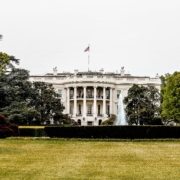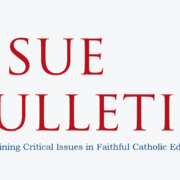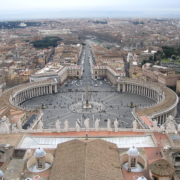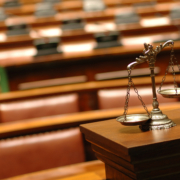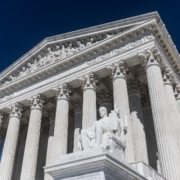As evangelical educational communities, Catholic schools not only teach academic subjects but also help their members on the road to personal holiness and sanctity in all areas of their lives, with a special concern for those areas most in need of healing and growth in each individual’s situation. With their focus on young children and older minors, Catholic schools are especially attentive to the moral and social formation of their students.
Catholic schools are also aware of the preeminent role parents[1] play in student academic and moral formation, and the Church has long emphasized parents as the first and primary educators of their children.[2] Research shows that parental involvement with their children’s schooling has a positive effect on academic achievement.[3] This research also reports that both contexts (home and school) exert significant socializing influence, including moral development,[4] on the child. The greater the overlap and harmony among these contexts, the higher the probability for children’s success in school and in life.[5]
Not surprisingly, Catholic schools find their greatest mission success when there is strong alignment between home and school expectations in academic, religious, and moral outlook and goals. And while their evangelical efforts assume that not all students and families are fully formed in the faith, it is important that Catholic schools establish and maintain a strong Catholic identity and ensure to the degree possible there is a strong core of on-mission families and students, so as to best serve those who might yet need additional formation. A preponderance of on-mission community members can help set the tone and culture and help bring the others along by witnessing to the joy of the Gospel lived in family and school life. Parents can help make or break a school culture and serve to evangelize each other. All members of Catholic educational communities are called to ongoing conversion and holiness.
In the current common culture, evangelization is especially needed on issues of marriage and sexual morality. A challenge for Catholic schools today is that many families are entering Catholic schools deeply wounded or confused about marriage and human sexuality as God intends it. Most of today’s parents grew up in a post-sexual revolution world where relentless media-portrayals of marriage, the family, and human sexuality have largely been at odds with Catholic teaching. Many parents of students entering Catholic schools are either unaware of a Catholic understanding in these areas or have dismissed or rejected them, with a majority of Catholics now favoring same-sex marriage, cohabitation, birth control, and divorce and remarriage.[6]
This presents a significant challenge to the Church and her schools, which are charged with presenting the fullness of Christ’s loving message and the truth about human sexuality, marriage, and the family, all of which are under unprecedented attack by the media and the common culture. In all cases, administrators must handle each situation in a sensitive and charitable manner while teaching the fullness of faith[7] adapted to the context, in a forthright and truthful way. Indeed, there is no authentic love or charity without truth.
At the heart of the truth about marriage and sexuality is the Church’s clear and consistent teaching that marriage is a life-long union of one man and one woman; that a man and a woman united in marriage, together with their children, form a family; and that the family is ordered to the good of a husband and wife and to the procreation and education of children.[8] The Church has always taught that the marriage act is exclusively ordered to love and life within the confines of a lifelong marriage between one man and one woman.[9] Outside of this, sexual activity is gravely sinful, as is remarriage without a declaration of nullity. While many traditional and even nontraditional families will be aware of and supportive of these perennial teachings, others may be unaware or unsupportive. Such truths may be difficult for these families to hear, but they are truths that Catholic schools must teach and witness to with clarity and charity. In hard cases, especially around human sexuality, the Vatican has noted that “departure from the Church’s teaching, or silence about it, in an effort to provide pastoral care is neither caring nor pastoral. Only what is true can ultimately be pastoral.”[10]
In working with nontraditional or wounded families struggling in these areas, educators should listen and seek to understand their complexities and limitations. Educators should not underestimate the time, compassion, and resources this worthwhile outreach will require or assume that the school is the best or only vehicle for evangelization in such cases. Educators should also always keep in mind that nontraditional families are not burdens, but beloved children of a God who loves them intimately and has a plan of growth, healing, or conversion for them. Catholic school leaders then must do all they can to facilitate the conversation around that divine plan, which may possibly include delaying, denying, or revoking enrollment in a Catholic school if it poses a threat to the school’s religious mission or causes confusion and scandal.
Circumstances for Delaying or Denying Admission
Before exploring working with more nuanced family cases, it is important to acknowledge that there may be cases where the disconnect between a Catholic school’s religious mission and the family’s needs and situation are so great that admission needs to be denied. Two such situations are if a family clearly rejects the school’s religious mission or if admission might bring Church teaching into ill repute or lead others to sin.
The religious mission of Catholic education includes Christian evangelization and moral formation. Families seeking admission need not be fully evangelized or committed Catholics, but they must recognize and respect the distinctive Catholic identity of the school and not actively work against its mission of moral formation or hinder the school’s ability to clearly teach Catholic beliefs. For example, a fundamentalist Protestant family that wanted the school’s academic program but insisted on publicly proclaiming to students and families that Catholics are not going to Heaven, an atheist family publicly proclaiming to students and families that religion is hogwash, or a family deeply and actively involved in so-called New Age practices or in the occult would not be suited to a Catholic school.
So, too, enrollment should be denied if a family’s example might cause moral confusion or scandal, or if the school appears to condone sinful behavior and thereby brings the school or the Catholic faith or morals into ill repute. The school’s mission is to promote holiness and the good. The school cannot seem to condone sinful behavior or allow what is sinful to be presented as a good to be pursued. This would contradict the mission of Catholic education.
The Church understands scandal as
an attitude or behavior which leads another to do evil. The person who gives scandal becomes his neighbor’s tempter. He damages virtue and integrity; he may even draw his brother into spiritual death. Scandal is a grave offense if by deed or omission another is deliberately led into a grave offense.[11]
So grave is causing scandal in children and young adults that Jesus offers this chilling warning:
Whoever causes one of these little ones who believe in me to sin, it would be better for him to have a great millstone fastened round his neck and to be drowned in the depth of the sea” (Matt. 18:6).
It can be morally confusing and scandalous to admit a family that actively and publicly engages in cohabitation, polygamy, incest, or homosexual activity in the same way that it could be scandalous to enroll the family of a notorious and unrepentant abortionist, drug dealer, or mafioso. The sins are quite different, but the broad principle is that a Catholic school cannot be seen as condoning publicly sinful and unrepented behavior, treating it as inconsequential, or, even worse, seeming to promote it as good or normal behavior to be imitated by others. Hopefully such situations are rare, but the school must ensure that its religious mission of moral formation and evangelization is not publicly compromised, hindered, or undone by significantly and publicly off-mission families.
All messaging within the school community contributes to the educative and formative mission of the Catholic school. Parents and school administration and teachers should work in harmony to avoid mixed messages to children and young adults.
Especially in the case of an immoral union of parents, disunity between home and school runs the risk of either harming a school’s mission or upsetting a home formed around an immoral union. This is a risk that must be carefully considered in each circumstance. The school may at some point be required to teach the truth about the student’s family situation. If the student is aware of the problem, one of two outcomes is possible: either the student (especially if young) will be alienated from the parents on whom they fundamentally rely for emotional and physical support, or much more likely, the student will feel alienated from the Church and God who appear to be condemning their home situation. Older students might, in rare cases, be able to negotiate these nuances, but should they also find themselves tempted to the sins of their parents, the school’s ability to proffer a viable alternative will be hampered by the fact that the parents’ immoral union is being witnessed day-in and day-out in the home. These various dynamics may eviscerate a joint formative enterprise that should exist but simply does not.
Furthermore, there may be undue stress on the teachers who need to be able to speak clearly and publicly about moral truth without fear of harming a child’s emotional well-being or home life. Teachers are naturally reticent to say or do things that might upset the student or the parent/student bond. There may be disruption to the class, as the teacher attempts to balance the conflicting ends of protecting the feelings of the suffering child while at the same time not allowing spiritual damage and confusion to spread to other children. Discharging a Catholic school teacher’s duties in such a dysfunctional situation can be deeply problematic and disruptive to the teacher’s duties.
In circumstances when parents are striving sincerely to regularize a situation, or if a Catholic school otherwise deems it appropriate to enroll a child despite irregularities or immoralities in the home, both the school and the parents should be prepared for difficulties and for the possibility that enrollment in the school may no longer serve the good of the student or the school. The parents may do well to explain the tentative situation to the student in advance of any difficulty, or at least be prepared with a clear explanation if troubles arise. The school should likewise prepare to respond to questions from students, other parents, and employees about a family’s situation and how the school is upholding its Catholic mission.
Catholic Families Journeying Toward Fullness of Catholic Faith and Morals
There are many families today who are working toward a fuller and deeper understanding of the Catholic faith but do not explicitly reject the mission of Catholic education due to ill will. In these cases, a Catholic school experience can be a significant aid toward this actualization. Schools offer such families catechesis and formation; if more personal care is needed, families can be referred to other parish or diocesan resources.
Those Catholic families who struggle more significantly with the acceptance of elements of Catholic faith or morals need the help of their parish priest or staff to discuss areas of conflict or uncertainty and to seek reconciliation with the Church. The integrity of such pastoral intervention is absolutely dependent on pastors and counselors being faithful to Catholic teaching and working closely in harmony with the Catholic school administrators and teachers as a cohesive team. Those known to be in unchaste unions (e.g., cohabiting, contracepting, or remarried without a declaration of nullity) need to hear the Church’s teaching, presented charitably and clearly, that the marriage act is reserved solely to a man and woman in a lifelong marriage open to the service of love and life. Those who struggle with elements of the Catholic faith or morals, whether in areas of human sexuality or elsewhere, can work through these issues confidentially without contradicting or publicly resisting the Catholic school’s efforts to teach students the fullness of the faith. Such a conflict could require denial of admission or dismissal from the school.
Families from Another Faith
Catholic schools will normally welcome non-Catholic families of goodwill who are expressly and affirmatively supportive of the school’s primary Catholic religious mission, but some points of guidance are needed. Non-Catholics whose religious practices and beliefs run counter to Church teaching—especially non-Christians—might experience conflicts as a school seeks to maintain mission integrity. Sincere questioning of the practices of the Catholic faith in order to more deeply understand them could be healthy to the student, but open hostility, public defiance, and public challenges against Catholic truths or morality are signs that a family is not a good fit for a school’s primary evangelical mission and, thus, may be denied admission or may be asked to leave the school.
There are also cases in which a child’s parent or guardian may sincerely desire for the child to have the chance to embrace a faith they have at present rejected. Such situations are opportunities for evangelization.
Non-Catholic students deserve the same religious instruction as Catholics, with grades in religion classes based on understanding of the faith content and not personal belief or practice of the faith.
Non-Catholic students should normally attend the same religious services and activities held during school hours required of Catholic students, participating to the extent they are able. During Mass non-Catholics may be expected to follow the rubrics of the Mass (i.e., standing, sitting, and kneeling with the community), just as a guest stands for the national anthem when visiting a foreign country without any violation of conscience.
The school’s Catholic chapel is open to all members of the school community for reverent prayer, but formal or ritual non-Catholic prayer services or activities are inappropriate and may be blasphemous. Non-Catholic students should be expressly prohibited from aggressively attempting to convert Catholic students.
In our pluralistic society, some contend that the occult is a religion that should be accepted. However, Satanic, wiccan, occult, or other blasphemous behaviors or practices are serious conflicts with a Catholic school’s mission and may result in the expulsion of a student.
The Truth, especially as present within the Sacraments, is powerful in its evangelizing effect. In a faithful Catholic school, all personnel make themselves available to students who have open and honest questions about admission into the Catholic Church. The school expects parents of non-Catholic students to allow them to formally transition into the Catholic faith by following Church protocols for candidates and catechumens, should a student wish to do so.
Single-Parent Households
A single-parent household is not normally a barrier to enrolling in a Catholic school. In some cases, a child’s parent may have died or may have abandoned the family, or a single non-parental caregiver may have generously stepped forward to care for a child whose parents are not present due to tragedy or death. Still in other cases the child may have been born out of wedlock. Whatever the case, sensitivity is called for.
By choosing a Catholic education for the child, the parent agrees to work in harmony with the school as it teaches the truths of the Catholic faith, including the areas of marriage, chastity, and divorce, and to consult the school or local parish priest if questions pertaining to the faith arise. The parent also agrees to avoid behaviors which are contrary to Catholic teaching (e.g., sexual promiscuity or adultery).[12] As with all families and social situations, should an occasion of public scandal arise, the family may be asked to withdraw.
Cohabiting Couples Forming a Household
If during the admissions process or after enrollment the school becomes aware of a couple living together without valid marriage, it upholds its commitment to truth and to the good of the student by referring the couple to the local pastor for counseling and catechesis, in the hope of starting down a path of regularization. Many people today are unaware that couples who live together:
…offend against the dignity of marriage; they destroy the very idea of the family; they weaken the sense of fidelity. They are contrary to the moral law. The sexual act must take place exclusively within marriage. Outside of marriage it always constitutes a grave sin and excludes one from sacramental communion.[13]
Given the intricacies involved in setting such complex relationships aright, a couple may avoid scandal by living in chastity appropriate to their state in life. But if a pastor is aware that a catechized couple refuses to strive for a life of chastity, and in his judgment the couple is unlikely to consider such a move with additional outreach and catechesis, he may need to instruct them not to enroll or to withdraw their student from the Catholic school. This is especially necessary if issues of public scandal arise.
Parents Divorced and Remarried Outside the Church
The Church considers a valid marriage to be a permanent union between a man and a woman.[14] Individuals who have separated from their spouse, for whatever reason, are to remain chaste. Those who have divorced and remarried outside the Church and are reasonably assumed to be sexually active with their new partner, are involved in living an immoral lifestyle.
If the school becomes aware of such a situation, whether during the admission process or during the course of the school year, it may ask the couple to meet with the local parish priest to determine their status and if and how that status might be regularized in the Church. The pastor can provide guidance to both Catholics and non-Catholics who have been previously married, to help them understand and regularize their ecclesial status. As a couple makes their way through this sometimes lengthy, complicated, and complex process, they should do all they can to avoid scandalizing students.
If a couple refuses to attempt regularization or is unwilling to strive to meet Church requirements given their marital status, it may be prudent to ask them to withdraw their student from the Catholic school.
Same-Sex Unions
The circumstance of a same-sex union is not identical to that of other parents in irregular or immoral family situations. Same-sex couples who advocate and persist in their union actively and publicly model a different morality, present a lived counter-evangelization, and have a different understanding of what Christian integration of the mind, body, and spirit looks like. Admitting students from families formed around same-sex unions, therefore, is a certain cause of scandal in Catholic schools and invites moral confusion.
The Church is clear that a union attempted by persons of the same biological sex is opposed to Catholic teaching and the very nature of sexuality, marriage, and family. Scripture[15] consistently teaches the immorality of homosexual acts. The Catechism of the Catholic Church builds upon scripture and teaches that homosexual acts are “acts of grave depravity” and are “intrinsically disordered.” Such acts are
contrary to the natural law. They close the sexual act to the gift of life. They do not proceed from a genuine affective and sexual complementarity. Under no circumstances can they be approved.[16]
Unlike irregular unions between a man and woman, which often can be regularized and may be publicly ambiguous, same-sex unions are impossible to regularize and are visibly always a contradiction to Church teaching. Authentic marriage, as consistently affirmed by the Catholic faith, can only be between one man and one woman who are complementary in nature.[17] Pope Francis in Amoris Laetitia re-affirms the Church’s position that “there are absolutely no grounds for considering homosexual unions to be in any way similar or even remotely analogous to God’s plan for marriage and family.”[18]
Catholics are never permitted to approve of same-sex unions. Justice demands that Catholics exercise the right to conscientious objection when faced with same-sex unions approved by civil law. According to the Vatican Congregation for the Doctrine of the Faith, “The denial of the social and legal status of marriage to forms of cohabitation that are not and cannot be marital is not opposed to justice; on the contrary, justice requires it.”[19]
The same-sex couple is directly responsible for creating confusion and scandal, by establishing a social structure which leads to the decline of Christian morals through the manipulation of public opinion.[20] They are openly engaged in and openly promote public, unrepentant, objectively disordered behavior. But the school itself can become complicit in confusion and scandal when its interaction with the same-sex couple generates the appearance of normalcy, creating an intractable conflict of position and grave confusion among children and families about the nature of marriage as the union between a man and a woman.
The scandal is not simply a fear that students might become same-sex active themselves or someday form their own same-sex union, but more importantly there is a real concern that this arrangement might cause students to become contemptuous of the Church or become moral relativists on a host of other issues of morality. Moral relativism, because it denies objective truth as an approach to reality, is a real and present danger to the eternal salvation of young people. Mission effectiveness and proper student formation depend upon creating a healthy and ordered learning environment free from moral confusion and moral relativism.
The school may also become complicit if it appears to support a sinful and unjust arrangement that denies students their natural rights. Pope Francis has emphasized that every child has a natural right to a loving mother and father.[21] As the Church refuses to participate in helping form same-sex households by providing adoption services, the Catholic school can refuse to condone and cooperate with a social structure which denies children their natural right to a biological mother and father and places them in spiritual danger.
Students Presenting with Same-Sex Attraction[22]
All students are called to chastity, which is the successful integration of sexuality within the person according to their state in life. In most cases this virtue is developed in the context of students learning to acquire control over opposite-sex attraction in preparation for marriage. However, this universal call to chastity can be even more complicated, but no less required, in cases of same-sex attraction.
The Catholic Church teaches that physical same-sex relations work against the proper order of procreation and complementarity designed by God and because of this, such sexual activities are intrinsically disordered and contrary to natural law.[23] While the topic of same-sex attraction may be an appropriate academic topic of discussion in advanced classes, a Catholic school’s mission is compromised if students are allowed to advocate or celebrate same-sex attraction as a personal positive good in the context of classes, activities, or events. Such persistent and scandalous activity may be cause for dismissal from the school. Catholic schools generally use the term “same-sex attraction” rather than “homosexual orientation,” because there is only one proper sexual orientation: that which orients a man to a woman and vice versa in the bonds of matrimony. Given that labels can falsely promote a lasting identification or enduring notion of self, the school should avoid labeling individuals with such terms as “gay,” “lesbian,” “bisexual,” or “queer,” even when the individual might desire such identification.[24] Allowing open or flagrant promotion of same-sex behavior would advance a position considered gravely sinful by the Church as normative and good.
A faithful Catholic school will present students who disclose same-sex attraction during the admissions process or in other school situations the beautiful and liberating teachings of the Catholic Church on God’s design for the human person and human sexuality. The Church encourages individuals experiencing same-sex attraction to pursue the virtues of chastity, self-mastery, and friendship instead of acting upon those inclinations romantically or sexually.[25] These students should, as a condition of enrollment, work with appropriate Church and diocesan offices, ministries,[26] and counselors who can provide psychological, sociological, and spiritual care[27] in the hope of overcoming individual challenges and living in harmony with Christ’s teachings as shared through his Church.[28]
Parent Identifying Contrary to Biological Sex
Parents experiencing confusion regarding their sexual identity and who seek to express a gender other than their biological sex face grave personal difficulties. The school, while sensitive to the suffering such a psychological disconnect from one’s biological sex may cause in a parent, nevertheless must work toward a mode of interaction with all members of the school that properly esteems the reality of their biological sex.
The Catholic school can present such parents with the Church’s teaching about the human person and God’s plan for mankind and agree to this teaching for their children. In particular cases, parents may be directed to the local pastor and other faith-based psychologists and medical personnel, who can work with them to address their gender dysphoria.
At the very least, as a condition of a student’s enrollment, the parent whose sense of sexual identity is compromised must agree not to draw attention to his or her gender incongruence, so as not to confuse or scandalize the students.
Student Identifying Contrary to His or Her Biological Sex[29]
Prospective or current students presenting as a gender other than their biological sex require counseling, along with their parents, on the Catholic Church’s position that God created humans male and female and the complementarity between men and women is for the good of spouses and the propagation and generation of humanity.
In such situations, a faithful Catholic school will inform the student and the student’s parents that the school interacts with all students according to their biological sex, rather than on the basis of professed “gender identities.” The family should be willing to work toward integrating the student’s sexual identity with their biological sex, including counseling with their pastor and other trained Catholic medical and psychological professionals who are best able to help them in clarifying and defining issues of self (and sexual) identity in accord with Catholic teaching and God’s natural plan.[30] If the student or parents insist on a name, clothing, or behavior that publicly signal gender dysphoria, the student may be asked to leave the school.
It harms students to encourage misidentification during a socially and sexually challenging time of their lives, whether it be a deep-seated “belief” or a persistent “wish.”[31] Studies indicate that 80-95 percent of students experiencing dissonance between their biological sex and gender expression will naturally outgrow it,[32] and that limiting external expressions of the disconnect helps overcome it.[33] Regardless of the student’s perceptions, a Catholic school seeks to promote the welfare of all students, which is only ensured when truth is acknowledged.
Those who wish to express a gender other than what is naturally in harmony with their biological sex are understood as operating outside of a “reality deeply inscribed” within.[34] Assisting the person in his or her disconnect with this reality, however sincerely experienced, by agreeing to participate in any efforts to change natural gender expression is contrary to the pursuit of the truth. Authentic love, a gift of the self for the good of the other, requires that Catholic educators compassionately dwell in the truth and assist those they love to do the same.
Student Conceived by In-Vitro Fertilization or Born Through Surrogacy
Children are always a gift from God, no matter the circumstances of their conception. It would therefore seem inappropriate to bar a student from enrollment in a Catholic school, because of conception through in-vitro fertilization or surrogacy. But a parent’s or student’s public and persistent advocacy for these artificial methods of generating life, which undermines the teaching of the Church and the formative efforts of the school, is cause for dismissal.
The Church teaches that these methods are gravely immoral, since they disassociate conception from the sexual act between the biological mother and father, and that the “use of such technology is not a replacement for natural conception, since it involves the manipulation of human embryos, the fragmentation of parenthood, the instrumentalization and/or commercialization of the human body, as well as the reduction of a baby to an object in the hands of science and technology.”[35]
Parents should know that if a situation requiring clarification presents itself, all students will be taught that those members of God’s family conceived by in-vitro fertilization or born through surrogacy are wholly good, completely loved, and willed by God, even though the means chosen to bring about their conception were morally unacceptable.[36]
Conclusion
The challenges facing Catholic schools and the often-wounded families they are called to serve are significant and can almost seem overwhelming. This is a time calling not just for compassion, but also for courage. Courage to fulfill this ministry is required in a culture which may brand such teaching as judgmental or intolerant. Educators need courage to teach the faith in season and out, as inspired by the words of St. Paul:
Proclaim the word; be persistent whether it is convenient or inconvenient; convince, reprimand, encourage through all patience and teaching. For the time will come when people will not tolerate sound doctrine but, following their own desires and insatiable curiosity, will accumulate teachers and will stop listening to the truth and will be diverted to myths. But you, be self-possessed in all circumstances; put up with hardship; perform the work of an evangelist; fulfill your ministry. (2 Tim 4: 2-5)
Compassion, of course, is also required. Many wounded families have not fully encountered the fullness of Church teaching or experienced the painful yet liberating process of repentance, amendment of life, and acceptance of Christ’s loving forgiveness and his plan for their lives. All teachers and administrators are called to be fully present to everyone, listening to their unique situations with compassion.
Administrators must work with other Church ministries to help identify and meet any unique needs and challenges facing a nontraditional family. This may involve enrolling a family in a Catholic school, or it may require revoking, denying, or delaying enrollment as a family undergoes initial faith formation and regularization through other Church ministries. In either case, the desire is to meet them where they are and eventually bring them home to full communion with Christ and His Church.
Dan Guernsey, Ed.D., has 30 years of experience in Catholic education at the collegiate level as an associate professor, dean, and president and at the K-12 level as a teacher and principal. He is a Senior Fellow at The Cardinal Newman Society, which promotes and defends faithful Catholic education.
[1] For the purposes of this paper, the terms “parent” or “parents” include the legal guardian(s) of a child. “Family” is used in the broad sense of any unit self-identifying as such and including a parent and child. A “nontraditional” family includes any variation from a faithfully Catholic family formed around a marriage that is valid according to the Catholic Church.
[2] Saint Pope Paul VI, Gravissimum Educationis (1965) 6; Pope Pius XI, Divini Illius Magistri (1929) 35.
[3] William H. Jeynes, “A Meta-Analysis of the Relation of Parental Involvement to Urban Elementary School Student Academic Achievement,” Urban Education, Vol. 40, No. 3 (2005) 237-269; William H. Jeynes, “The Relationship Between Parental Involvement and Urban Secondary School Student Academic Achievement: A Meta-Analysis,” Urban Education, Vol. 42, No. 1 (2007) 82-110; S. Wilder, “Effects of Parental Involvement on Academic Achievement: A Meta-Synthesis,” Educational Review, Vol. 66, No. 3 (May 2013) 377-397; Sira Park and Susan D. Holloway, “The Effects of School-Based Parental Involvement on Academic Achievement at the Child and Elementary School Level: A Longitudinal Study,” The Journal of Educational Research, Vol. 110, No. 1 (May 2016) 1-16.
[4] See Mahwish Safder and Abid Hussain Ch., “Relationship Between Moral Atmosphere of School and Moral Development of Secondary School Students,” Bulletin of Education and Research, Vol. 40, No. 3 (2018) 63-71, showing correlations between the morality of teachers and peers and the morality of students and other studies mentioned in article.
[5] Anne Gregory and Rhona Weinstein, “Connection and Regulation at Home and in School: Predicting Growth in Achievement for Adolescents,” Journal of Adolescent Research, Vol. 19, No.4 (2004) 405-427; Ercan Kocayoruk, “Parental Involvement and School Achievement,” International Journal of Human Behavioral Science, Vol. 2, No. 2 (2016); Susan M. Sheridan, Lisa L. Knoche, and Andrew S. White, “Family-School Partnerships in Early Childhood: Exemplar of Evidence-Based Interventions,” in Steven Sheldon and Tammy Turner (Eds.), The Wiley Handbook of Family, School, and Community Relationships in Education (Hoboken, NJ: John Wiley & Sons, Inc., 2019), 190-191.
[6] David Masci and Gregory Smith, “7 Facts about American Catholics” (2018) at
https://www.pewresearch.org/fact-tank/2018/10/10/7-facts-about-american-catholics/ (accessed Dec. 3, 2020).
[7] Congregation for Catholic Education, Male and Female He Created Them: Toward a Path of Dialogue on the Question of Gender Theory in Education (2019) 56.
[8] Catechism of the Catholic Church (Vatican City: Libreria Editrice Vaticana, 1993) 1601, 1652.
[9] Catechism, 1603-5, 1646.
[10] Congregation for the Doctrine of the Faith, Letter to the Bishops of the Catholic Church on the Pastoral Care of Homosexual Persons (1986) 15.
[11] Catechism 2284.
[12] See Catechism 2380-2386 on adultery and divorce.
[13] Catechism 2390.
[14] Catechism 1605, 1622; Saint John Paul II, Familiaris Consortio (1981) 67.
[15] Rom. 1:26–27; 1 Cor. 6:9–10; 1 Tim. 1:8–10; Jude 7; Leviticus 18:22.
[16] Catechism 2357.
[17] Catechism 1625.
[18] Pope Francis, Amoris Laetitia (2016) 251.
[19] Congregation for the Doctrine of the Faith, Considerations Regarding Proposals to Give Legal Recognition to Unions Between Homosexual Persons (2003) 8.
[20] Catechism 2286.
[21] Edward Pentin, “Pope’s Address to Colloquium on Complementarity of Man and Woman” at http://www.ncregister.com/blog/edward-pentin/pope-francis-address-to-colloquium-on-complementarity-of-man-and-woman (accessed on Feb. 28, 2020).
[22] This section is adapted from Dan Guernsey and Denise Donohue, Human Sexuality Policies for Catholic Schools (2016) at https://cardinalnewmansociety.org/human-sexuality-policies-catholic-schools/
[23] Catechism 2357-2359.
[24] Rev. Paul Scalia, “A Label That Sticks,” First Things (June 2005) at https://www.firstthings.com/article/2005/06/a-label-that-sticks (accessed on Nov. 10, 2020).
[25] Congregation for the Doctrine of the Faith, Persona Humana (1975) 8; Synod of Bishops, The Pastoral Challenges of the Family in the Context of Evangelization: Instrumentum Laboris (2014) 110-112.
[26] See Courage International at https://couragerc.org/
[27] Congregation for the Doctrine of the Faith (1986) 15, 17.
[28] Michael J. Maher, “Gay and Lesbian Students in Catholic High Schools: A Qualitative Study of Alumni Narratives,” Catholic Education: A Journal of Inquiry and Practice, Vol. 10, No. 4 (2007) 449-472.
[29] This section is adapted from Guernsey and Donohue (2016).
[30] The Diocese of Steubenville and the Ohio Catholic Conference have created separate written agreements to be signed by all school families and the school, which specifically include mention of gender dysphoric students and the limits of the school in accommodating them.
[31] Thomas D. Steensma, Jenifer K. McGuire, et. al., “Factors Associated with Desistence and Persistence of Childhood Gender Dysphoria: A Quantitative Follow-up Study,” Journal of the American Academy of Child and Adolescent Psychiatry, Vol. 52, No. 6 (June 2013) 583.
[32] See American College of Pediatricians, Gender Dysphoria in Children (Nov. 2018) at https://acpeds.org/position-statements/gender-dysphoria-in-children (accessed Feb. 28, 2020); and Paul R. McHugh, Paul Hruz, and Lawrence S. Mayer, Brief of Amici Curiae in Support of Petitioner, Gloucester County School Board v. G.G., Supreme Court of the United States, No. 16-273 (January 10, 2017) 12.
[33] Kenneth J. Zucker, Hayley Wood, et al., “A Developmental, Biopsychosocial Model for the Treatment of Children with Gender Identity Disorder,” Journal of Homosexuality, Vol. 59 (March 2012) 382. See Table 3, p. 384 for family school interventions for individual student needs.
[34] Congregation for the Doctrine of the Faith, Letter to Bishops of the Catholic Church on the Collaboration of Men and Woman in the Church and the World (2004) 8.
[35] Catechism 2376-2377; Congregation for Catholic Education (2019) 28.
[36] John M. Haas, “Begotten Not Made: A Catholic View of Reproductive Technology,” at http://www.usccb.org/issues-and-action/human-life-and-dignity/reproductive-technology/begotten-not-made-a-catholic-view-of-reproductive-technology.cfm (accessed on Feb. 28, 2020).

